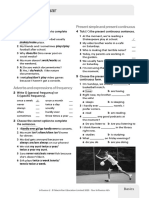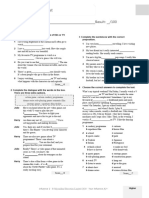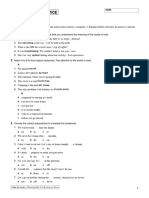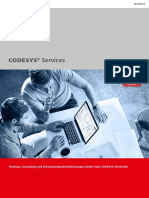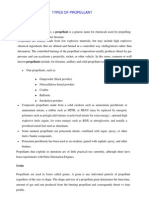0 ratings0% found this document useful (0 votes)
505 views1º ESO Unit 2 Task
1º ESO Unit 2 Task
Uploaded by
sdbdigicolegiosanlorenzoThis document contains a grammar lesson on adverbs of frequency and present simple questions, as well as exercises on daily routines, likes and dislikes, school subjects, and a dialogue. The three main points are:
1. The first section teaches about adverbs of frequency like "always" and "never" and how to form present simple questions using wh- words like what, where, who.
2. Several exercises have students writing out daily routines, completing sentences about likes and dislikes, and filling in school subject names.
3. A dialogue is completed using school subject vocabulary where two students discuss their favorite subjects.
Copyright:
© All Rights Reserved
Available Formats
Download as DOCX, PDF, TXT or read online from Scribd
1º ESO Unit 2 Task
1º ESO Unit 2 Task
Uploaded by
sdbdigicolegiosanlorenzo0 ratings0% found this document useful (0 votes)
505 views2 pagesThis document contains a grammar lesson on adverbs of frequency and present simple questions, as well as exercises on daily routines, likes and dislikes, school subjects, and a dialogue. The three main points are:
1. The first section teaches about adverbs of frequency like "always" and "never" and how to form present simple questions using wh- words like what, where, who.
2. Several exercises have students writing out daily routines, completing sentences about likes and dislikes, and filling in school subject names.
3. A dialogue is completed using school subject vocabulary where two students discuss their favorite subjects.
Original Title
1º ESO Unit 2 task
Copyright
© © All Rights Reserved
Available Formats
DOCX, PDF, TXT or read online from Scribd
Share this document
Did you find this document useful?
Is this content inappropriate?
This document contains a grammar lesson on adverbs of frequency and present simple questions, as well as exercises on daily routines, likes and dislikes, school subjects, and a dialogue. The three main points are:
1. The first section teaches about adverbs of frequency like "always" and "never" and how to form present simple questions using wh- words like what, where, who.
2. Several exercises have students writing out daily routines, completing sentences about likes and dislikes, and filling in school subject names.
3. A dialogue is completed using school subject vocabulary where two students discuss their favorite subjects.
Copyright:
© All Rights Reserved
Available Formats
Download as DOCX, PDF, TXT or read online from Scribd
Download as docx, pdf, or txt
0 ratings0% found this document useful (0 votes)
505 views2 pages1º ESO Unit 2 Task
1º ESO Unit 2 Task
Uploaded by
sdbdigicolegiosanlorenzoThis document contains a grammar lesson on adverbs of frequency and present simple questions, as well as exercises on daily routines, likes and dislikes, school subjects, and a dialogue. The three main points are:
1. The first section teaches about adverbs of frequency like "always" and "never" and how to form present simple questions using wh- words like what, where, who.
2. Several exercises have students writing out daily routines, completing sentences about likes and dislikes, and filling in school subject names.
3. A dialogue is completed using school subject vocabulary where two students discuss their favorite subjects.
Copyright:
© All Rights Reserved
Available Formats
Download as DOCX, PDF, TXT or read online from Scribd
Download as docx, pdf, or txt
You are on page 1of 2
UNIT
2 Grammar
Adverbs of frequency Present simple: Wh- questions
1 Complete the sentences with the verbs 3 Write questions for the underlined answers.
in the box and the adverbs in brackets.
1 Where do you play table tennis?
be (x2) do have phone get up tidy I play table tennis at my uncle’s house.
1 We always do our homework before 2
dinner. (always) My favourite writer is JK Rowling.
2 Maft and Sally late for 3
football practice. (hardly ever) He goes swimming on Monday evenings.
3 Yolanda early at weekends. 4
(never)
She lives in Istanbul.
4 Jane tired after school.
5
(sometimes)
I’ve got an umbrella because it’s raining.
5 I my room on Saturdays.
(usually) 6
6 You your best friend. (often) The school football team has got
11 players.
7 My grandparents lunch with
us on my birthday. (always)
Grammar round-up
Likes and dislikes 4 Complete the dialogue. Use one or
two words in each gap.
2 Complete the text with the correct form
of the words in the box and a suitable A: 1 Can you take good photos, Luis?
verb. B: 2 I can, Noor. I’ve 3
a great camera. 4 you got a
love like don’t mind good camera?
don’t like hate A: No, I 5 .
I 1 love going skateboarding, and I B: I love 6 photos! It’s my
2 basketball. My cousin, Kamil, favourite hobby.
3 exercise. He 4
A: I 7 ever take photos.
to music, and he 5 films with
his friends. I 6 to the cinema B: Well, here are my new photos. Take a look
with my friends at the weekend, too. at 8 .
Sometimes we go to a restaurant after A: They’re excellent! 9 is
the film. I 7 Italian food! that boy?
B: That’s my cousin, Oleg. He 10
live here.
A: Oh. 11 he live?
B: He 12 in Moscow.
A: Cool.
Influence 1 · © Macmillan Education Limited 2020 · Your Influence High
UN
1 Vocabular
Daily routines School subjects
1 Write one word in each gap to 5 Complete the school subjects in the table.
complete the text.
Sciences Creative Foreign
Most days I 1 get up at 7:00 am.
subjects languages
I2 breakfast with my mum
and brother, and then I 3 to 1 biology art 6F
school. We 4 school at 8:00 am. 2c 4d 7G
I5 lunch at school at 1:00 pm. 3p 5m
Then we 6 school at four o’clock
and I 7 home. I 8 my Physical Technology Other
homework, then I 9 dinner. exercise
I 10 to bed at 10:00 pm. 8P 9d citizenship
and technology geography
2 Write the missing verbs to complete
ICT
the sentences. 10 h
1 I clean my teeth in the morning.
6 Complete the dialogue with
2 We changed when we
words from exercise 5.
get home.
3 I my bed in the morning. ‘What’s your favourite subject?’ ‘I love sport so it’sPE.’
4 Lily a shower after school. ‘Can you speak?’
5 Can you your room, please? ‘No, but I can speak German.’
‘What do you do in your
6 I to sleep at 10:30 pm. lessons?’
3 Write the prepositions to ‘We sometimes play the guitar or the piano.’
complete the sentences. ‘Do you like science?’
1 We wake up at 7:00 am.
2 Rob has a shower
the morning.
3 Jane packs her bag half ‘I like biology and physics but I think
past seven. is difficult.’
4 We have a chemistry lesson
Fridays.
5 The lesson starts ten o’clock.
6 I don’t go out night.
4 Rewrite the text in exercise 1 so that it is
true for you.
Influence 1 · © Macmillan Education Limited 2020 · Your Influence High
You might also like
- GI A2 U1 Test StandardDocument5 pagesGI A2 U1 Test StandardClaudia M. SolanaNo ratings yet
- Synchronize3 Unit 2 ReadingDocument1 pageSynchronize3 Unit 2 ReadingJose Antonio Jimeno GarciaNo ratings yet
- SYNCHRONIZE 1 Tests U5Document9 pagesSYNCHRONIZE 1 Tests U5paula villaNo ratings yet
- Exam 1 EsoDocument4 pagesExam 1 EsoCarlos A. GonzalezNo ratings yet
- Sync2 U5 BADocument6 pagesSync2 U5 BAmfrancodlrubiaNo ratings yet
- (Andrew Davidson & Co) An Implied Prepayment Model For MBSDocument13 pages(Andrew Davidson & Co) An Implied Prepayment Model For MBSgatzarNo ratings yet
- L1 A2 U2 Grammar HigherDocument1 pageL1 A2 U2 Grammar HigherAlvaro Olgoso PérezNo ratings yet
- Synchronize2 TRB Worksheets Welcome Unit Standard GrammarDocument4 pagesSynchronize2 TRB Worksheets Welcome Unit Standard Grammarpapex582No ratings yet
- L1 A2 Starter Grammar BasicsDocument1 pageL1 A2 Starter Grammar BasicsMarcelo D'EliaNo ratings yet
- Synchronize3 TRB Worksheets Unit 2 Challenge GrammarDocument1 pageSynchronize3 TRB Worksheets Unit 2 Challenge Grammardanielbermejo09No ratings yet
- L1 A2 U1 Grammar HigherDocument1 pageL1 A2 U1 Grammar HigherJose Blas Gonzalez SanchezNo ratings yet
- Exercises Unit 1 Oxford Synchronize 3 StudentbookDocument6 pagesExercises Unit 1 Oxford Synchronize 3 StudentbookFer E SNo ratings yet
- Synchronize 3 Test U5 EOT YDocument61 pagesSynchronize 3 Test U5 EOT Yjuan100% (1)
- Sync2 Specific Competences Tests Speaking U3Document3 pagesSync2 Specific Competences Tests Speaking U3mfrancodlrubiaNo ratings yet
- Sync2 Specific Competences Tests Speaking EOT1Document3 pagesSync2 Specific Competences Tests Speaking EOT1mfrancodlrubia100% (1)
- Sync4 EOT2 ST 543644Document5 pagesSync4 EOT2 ST 543644Elena MontesNo ratings yet
- L3 B1 U2 Grammar HigherDocument1 pageL3 B1 U2 Grammar HigherAlejandro Trueba PardoNo ratings yet
- Synchronize1 TRB Worksheets Unit 7 Challenge VocabularyDocument1 pageSynchronize1 TRB Worksheets Unit 7 Challenge Vocabularymfrancodlrubia100% (1)
- Unit 1 Standard Test Without AnswersDocument4 pagesUnit 1 Standard Test Without AnswersNuria GL100% (3)
- Synchronize 3 Resources U5Document11 pagesSynchronize 3 Resources U5AinmaNo ratings yet
- Synchronize1 - TRB - Worksheets - Welcome Unit - Standard - VocabularyDocument1 pageSynchronize1 - TRB - Worksheets - Welcome Unit - Standard - VocabularymfrancodlrubiaNo ratings yet
- Sync3 EOY CHBlinkDocument7 pagesSync3 EOY CHBlinkolgichusNo ratings yet
- COL - TRB 1 - Basic - Grammar Unit 1Document1 pageCOL - TRB 1 - Basic - Grammar Unit 1Mari:3100% (1)
- COL TRB 2 Standard Grammar Unit 2 Without AnswersDocument1 pageCOL TRB 2 Standard Grammar Unit 2 Without Answersmaximus24dp100% (1)
- 03 Real World 1 Tests Unit Tests SkillsDocument54 pages03 Real World 1 Tests Unit Tests SkillsLana100% (1)
- Synchronize3 TRB Worksheets Unit 1 Basic VocabularyDocument1 pageSynchronize3 TRB Worksheets Unit 1 Basic VocabularyDave GrammarsNo ratings yet
- Synchronize3 TRB Worksheets Unit 3 Challenge VocabularyDocument3 pagesSynchronize3 TRB Worksheets Unit 3 Challenge VocabularyJoan Carles Escoda Jurado0% (1)
- Sync2 U1 SpeakingDocument3 pagesSync2 U1 SpeakingmfrancodlrubiaNo ratings yet
- Mosaic 4 Extra Practice Unit 1Document4 pagesMosaic 4 Extra Practice Unit 1kiiinNo ratings yet
- KC5 Tests U05 EssentialDocument6 pagesKC5 Tests U05 EssentialMiriam MartinezNo ratings yet
- Grammar and Vocabulary Unit 7Document1 pageGrammar and Vocabulary Unit 7fernandoNo ratings yet
- L1 A2 U3 Test StandardDocument6 pagesL1 A2 U3 Test StandardRosa Arias Suarez100% (1)
- Examen Tema 1 y 2 InglesDocument7 pagesExamen Tema 1 y 2 InglesmamenNo ratings yet
- SYNCHRONIZE 2º ESO - Grammar Units 0-1 TestDocument4 pagesSYNCHRONIZE 2º ESO - Grammar Units 0-1 TestKarasukari Karasu100% (2)
- L1 A2 Starter Grammar StandardDocument1 pageL1 A2 Starter Grammar StandardhumananosequenosecuantoNo ratings yet
- L2 A2PLUS U1 Basics Grammar VocabularyDocument2 pagesL2 A2PLUS U1 Basics Grammar VocabularyÄÐåm Dris Said100% (2)
- Synchronize3 TRB Worksheets Review 1-4 Standard GrammarDocument3 pagesSynchronize3 TRB Worksheets Review 1-4 Standard GrammarTintincristi100% (1)
- KC5 Tests U06 StandardDocument6 pagesKC5 Tests U06 StandardTeacher MaryjoeNo ratings yet
- 3 Choices, Choices Extra Practice: Present Perfect With For and SinceDocument4 pages3 Choices, Choices Extra Practice: Present Perfect With For and SinceberofugoNo ratings yet
- Options2 ANK SBDocument29 pagesOptions2 ANK SBJose María Izquierdo MartinezNo ratings yet
- Synchronize1 - TRB - Worksheets - Welcome Unit - Challenge - VocabularyDocument1 pageSynchronize1 - TRB - Worksheets - Welcome Unit - Challenge - VocabularymfrancodlrubiaNo ratings yet
- KC5 Tests U06 EssentialDocument4 pagesKC5 Tests U06 Essentials8ghtm2v29No ratings yet
- Synchronize1 - TRB - Worksheets - Welcome Unit - Standard - VocabularyDocument2 pagesSynchronize1 - TRB - Worksheets - Welcome Unit - Standard - VocabularymfrancodlrubiaNo ratings yet
- L2 A2PLUS U1 Test HigherDocument6 pagesL2 A2PLUS U1 Test HighermariNo ratings yet
- 03choices1 U1 L3Document6 pages03choices1 U1 L3MARIA TERESA LOPEZ CINTASNo ratings yet
- L1 A2 U6 StandardDocument7 pagesL1 A2 U6 StandardnamoNo ratings yet
- 02 Advanced Think Ahead 3Document2 pages02 Advanced Think Ahead 3Maria Martos AlcarazNo ratings yet
- L2 A2PLUS U4 Grammar StandardDocument1 pageL2 A2PLUS U4 Grammar StandardberdascomaialenNo ratings yet
- Sync2 Specific Competences Tests LRW EOYDocument11 pagesSync2 Specific Competences Tests LRW EOYmfrancodlrubiaNo ratings yet
- Specific Competences TestsDocument6 pagesSpecific Competences TestsmfrancodlrubiaNo ratings yet
- L2 A2PLUS U1 Test HigherDocument5 pagesL2 A2PLUS U1 Test HigherGema del Campo MontoyaNo ratings yet
- Progress Test: VocabularyDocument5 pagesProgress Test: VocabularyRosa Arias Suarez100% (1)
- On Track Text TG3Document317 pagesOn Track Text TG3Girasol de pipasNo ratings yet
- Sync3 U6 STDocument6 pagesSync3 U6 STAna Conde100% (1)
- 01MakeTheGrade2 MorePractice1Document4 pages01MakeTheGrade2 MorePractice1MNo ratings yet
- Sync2 Specific Competences Tests LRW EOT2Document6 pagesSync2 Specific Competences Tests LRW EOT2mfrancodlrubia100% (1)
- Exam Unit 1Document3 pagesExam Unit 1Tobby MartinezNo ratings yet
- English Final Exam For Promotion 7 - 1st Term 2024Document4 pagesEnglish Final Exam For Promotion 7 - 1st Term 2024Henry VargasNo ratings yet
- CHOICES 1, UNIT 2, LEVEL 3Document4 pagesCHOICES 1, UNIT 2, LEVEL 3lasfotosdemarcos27No ratings yet
- Elementary Unit Test 6: GrammarDocument1 pageElementary Unit Test 6: GrammarNGUYỄN THỊ PHƯỢNGNo ratings yet
- Unit 2 Test: Consolidation: Total: / 100Document11 pagesUnit 2 Test: Consolidation: Total: / 100Cristhopher SotoNo ratings yet
- IELTS Speaking Part 1 - Structure of A Good AnswerDocument13 pagesIELTS Speaking Part 1 - Structure of A Good Answerttam02771No ratings yet
- CS 6381: Advanced Programming Laboratory Test - I, 2021Document5 pagesCS 6381: Advanced Programming Laboratory Test - I, 2021Ankita GuptaNo ratings yet
- History of Special EducationDocument7 pagesHistory of Special EducationAli Nawaz AyubiNo ratings yet
- Group Assignment #2 - Group Report Integrated Marketing CampaignDocument14 pagesGroup Assignment #2 - Group Report Integrated Marketing Campaignapi-666985971No ratings yet
- BTECDocument2 pagesBTECJoshu WainNo ratings yet
- Details of Competitive ExamsDocument18 pagesDetails of Competitive ExamsSameer ShaikhNo ratings yet
- Advanced BGP ATTDocument106 pagesAdvanced BGP ATTDanarNo ratings yet
- CODESYS Services enDocument5 pagesCODESYS Services enFabricio PazNo ratings yet
- Adnan MustafaDocument8 pagesAdnan MustafaAdnan MustafaNo ratings yet
- Sampaloc, Manila Effective SY 2014-2015: First Semester Second SemesterDocument2 pagesSampaloc, Manila Effective SY 2014-2015: First Semester Second SemesterjamNo ratings yet
- Mercantilism - WikipediaDocument5 pagesMercantilism - WikipediaJay VeeNo ratings yet
- Tracing OriginsDocument34 pagesTracing Originsnawala_sa_asyaNo ratings yet
- Freemium Software - A Guide For Startups (IVP October 2012)Document7 pagesFreemium Software - A Guide For Startups (IVP October 2012)jules_maltz100% (1)
- Article 3 - The Relationship Between Freelance Workforce IntensityDocument15 pagesArticle 3 - The Relationship Between Freelance Workforce IntensityNews WorldNo ratings yet
- Antoine Resume 52020Document2 pagesAntoine Resume 52020api-512211605No ratings yet
- Artificial IseminationDocument6 pagesArtificial IseminationHafiz Muhammad Zain-Ul AbedinNo ratings yet
- Kamed English Teacher. Present Perfect PDFDocument46 pagesKamed English Teacher. Present Perfect PDFKamed GarciaNo ratings yet
- Tooth To Implant ConnectionDocument36 pagesTooth To Implant ConnectionSamuel Flores CalderonNo ratings yet
- Types of PropellantDocument3 pagesTypes of Propellantkartikey0% (1)
- Lifestyle Evangelism-Part-4-Nurturing and Discipling-Ps Ashish RaichurDocument6 pagesLifestyle Evangelism-Part-4-Nurturing and Discipling-Ps Ashish RaichurapcwoNo ratings yet
- Cyberoam-iView Administrators - Guide PDFDocument153 pagesCyberoam-iView Administrators - Guide PDFi87sanNo ratings yet
- Prasar BharatiDocument12 pagesPrasar BharatiHussain ShaikhNo ratings yet
- Hinterachs-Lenkanlage RAS EC EDocument3 pagesHinterachs-Lenkanlage RAS EC Eruman214No ratings yet
- Speakout Writing Extra Pre-Intermediate Unit 11Document1 pageSpeakout Writing Extra Pre-Intermediate Unit 11Наташа ОлейникNo ratings yet
- Gat NTSDocument13 pagesGat NTSAli KhanNo ratings yet
- Morepen Laboratories Press Release Q1Document5 pagesMorepen Laboratories Press Release Q1gaurav chaudharyNo ratings yet
- MG201 ASSIGNMENT 2 Gillian Ariki S11087985Document5 pagesMG201 ASSIGNMENT 2 Gillian Ariki S11087985GeeNo ratings yet
- THE Distinctive Roles of Knowledge Assets in Facilitating Knowledge CreationDocument14 pagesTHE Distinctive Roles of Knowledge Assets in Facilitating Knowledge CreationShikha SharmaNo ratings yet
- Preparing For Disaster - The ScriptDocument16 pagesPreparing For Disaster - The ScriptBmagisaNo ratings yet



































